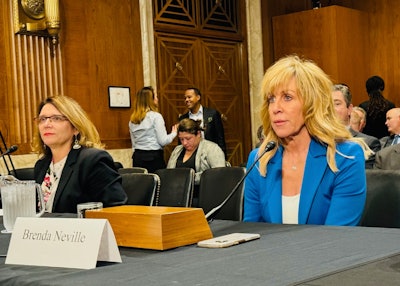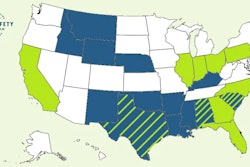
Trucking interests delivered a clear message to a Senate subcommittee Tuesday: If you want safer highways, you need to approve funds for more truck parking.
That sentiment was delivered to the Senate Committee for Environment and Public Works' hearing, "Understanding Roadway Safety: Examining the Causes of Roadway Safety Challenges and Possible Interventions." The messengers included a coalition of trucking interests, numerous law enforcement agencies, and the head of a state trucking association.
At the center of what the industry told members of the subcommittee was the need for the passage of the Truck Parking Improvement Act, which would allocate $755 million over three years for the construction of truck parking spots. The bill, which has versions in both houses of Congress, requires any project receiving funding must be publicly accessible and free of charge.
In her testimony Tuesday, Iowa Motor Truck Association President Brenda Neville said the lack of sufficient truck parking is hard on all truckers, but especially so for women drivers.
“There is simply not enough truck parking capacity along key freight corridors," Neville said. "The lack of truck parking has a severe impact on the health and well-being of truck drivers and even broader safety implications for the motoring public. In every conversation I have with female truck drivers, truck parking is always the first thing they mention when asked what needs to be improved.”
Neville also advocated for improving the condition of the highways and bridges truckers use daily and also asked Congress to repeal the 12% Federal Excise Tax on the purchase of new trucks and trailers, calling it a "disincentive to purchasing and deploying equipment with the latest safety and emissions technologies."
Ahead of Tuesday's hearing, a coalition of trucking organizations sent a letter to the committee asking the Truck Parking Improvement Act be passed, saying more parking would eliminate some of the unsafe many truckers are forced into.
“When truck drivers park in unsafe or unauthorized areas, including highway shoulders and off-ramps, or continue to drive in violation of federal hours-of-service regulations or beyond the point where they feel comfortable because they can’t find parking, it jeopardizes the safety of truck drivers and the general public, leading to congestion, accidents, and other hazardous scenarios,” the letter from the coalition said.
Signing the letter were:
- American Chemistry Council
- Consumer Brands Association
- National Association of Small Trucking Companies
- Truckload Carriers Association
- Institute for Safer Trucking
- Road Safe America
- Commercial Vehicle Safety Alliance
- Mid-West Truckers Association
- FMI – The Food Industry Association
- Transportation Intermediaries Association
- Women In Trucking
- American Apparel & Footwear Association
- American Trucking Associations
- Agriculture Transportation Coalition (AgTC)
- American Highway Users Alliance
- Retail Industry Leaders Association
- North American Punjabi Trucking Association
- International Brotherhood of Teamsters
- U.S. Chamber of Commerce
- National Association of Truck Stop Operators
Law enforcement agencies also weighed in on the issues. The group of 11 police and public safety organizations issued a statement that said:
“The national shortage of truck parking capacity is a serious safety issue that concerns the entire motoring public. Investment in infrastructure is a proven means to improving highway safety. Congress can play a constructive role by dedicating federal resources to expand truck parking capacity so that the nation’s professional truck drivers have greater access to safe and authorized parking options.”











